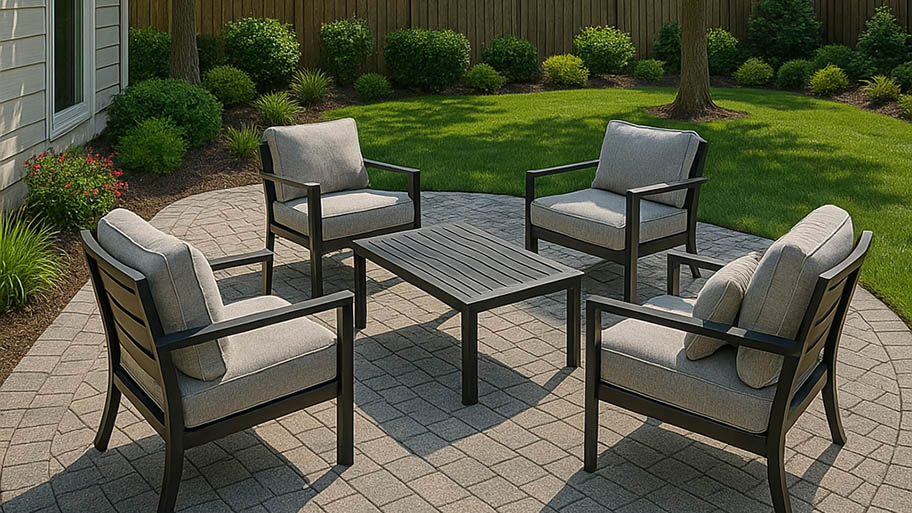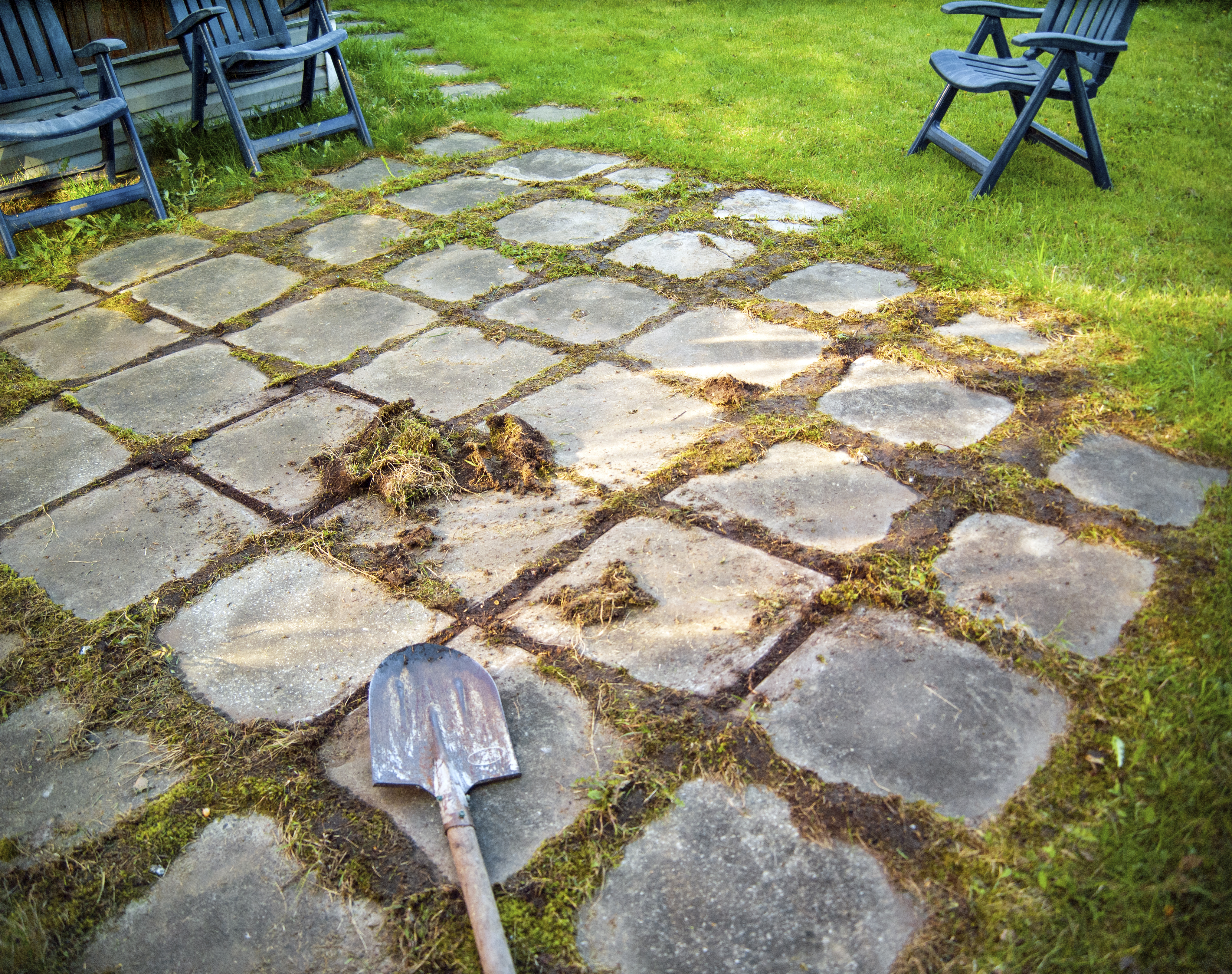
Looking to elevate your backyard aesthetic with a patio? Use this paver patio cost guide to help you estimate your total project cost before you get started.
Brick flooring costs average $12,000, with most homeowners paying between $9,000 and $15,000. Your price depends on floor size, brick type, labor, and installation complexity.


Brick flooring costs range from $10 to $30 per square foot.
Total installation costs vary based on floor size, brick type, and installation method.
Professional brick flooring installation costs $5 to $15 per square foot, ensuring longevity and proper sealing.
Maintenance and repairs can impact the long-term cost of brick flooring.
Brick floors can add value and unique character to your home.
This article was created using automation technology and thoroughly fact-checked and edited by an Angi Editor in accordance with our AI policy.
Brick flooring costs average $12,000 for a standard installation, with most homeowners spending between $9,000 and $15,000. Expect to pay $10 to $30 per square foot, depending on the type of brick, installation method, and labor rates. Whether you are updating a kitchen, adding character to an entryway, or outfitting a sunroom, knowing the full range of brick flooring costs helps you plan wisely and avoid surprises.
The size of your flooring project is one of the most important factors in determining the cost of brick installation. The total square footage directly affects how much material you need and the amount of labor required. Small entryways or mudrooms cost less overall, but may have a higher per-square-foot price due to minimum service fees. Kitchens and larger living areas benefit from bulk pricing on materials, but the total cost still rises with size.
Most contractors have a minimum project size of around 100 square feet to make the job worthwhile. When ordering materials, plan for an extra five to 10% to account for cuts, breakage, and waste. Covering a single room is more cost-effective per square foot than spreading brick throughout your entire home, but whole-home installations can sometimes unlock discounts.
| Project Size (Sq. Ft.) | Average Total Cost | Cost per Sq. Ft. |
|---|---|---|
| 50–100 | $1,000–$3,000 | $20–$30 |
| 150–300 | $2,000–$8,000 | $13–$27 |
| 400–700 | $5,000–$18,000 | $12–$26 |
| 1,000+ | $12,000–$30,000 | $10–$24 |
Your choice of brick plays a major role in project cost, appearance, and maintenance needs. Standard options include traditional clay brick, thin brick veneer, reclaimed brick, brick pavers, and porcelain tile that mimics brick.
Solid brick is thick and durable, but heavier and more complex to install, while thin brick veneer is lighter and less expensive to lay. Reclaimed brick adds character but may require extra prep. Each material has unique pros and cons, affecting the final price and long-term value.
| Brick Flooring Type | Cost per Sq. Ft. | Pros | Cons |
|---|---|---|---|
| Solid clay brick | $15–$30 | Extreme durability, classic look | Heavy, tricky to install, expensive |
| Thin brick veneer | $8–$18 | Lower cost, easier installation | Slightly less durable |
| Reclaimed brick | $12–$25 | Eco-friendly, unique appearance | Irregular sizing, variable quality |
| Brick pavers | $10–$22 | Good durability, many patterns | Can be slippery if sealed improperly |
| Porcelain brick-look | $7–$20 | Water-resistant, uniform sizing | Less authentic feel |
Where you live and where you want the brick flooring installed in your home can impact your total cost. Material and labor prices fluctuate by region, with urban areas often charging more than rural locations. Local brick availability, shipping fees, climate, and building codes all play a part. For example, freeze-thaw climates require special installation methods and materials.
The cost of flooring installation also varies depending on where you’re installing it within your home. Kitchens and entryways are popular spots and may require extra sealing or transition strips. Basements or below-grade rooms need additional waterproofing and moisture barriers, which increase costs. Tight spaces, stairs, or upper floors can raise labor costs due to accessibility challenges.
Several factors influence your total brick flooring cost, from labor and permits to custom features and site conditions.
Brick flooring is a specialty job, often completed by flooring contractors, masons, or tile installers. Labor rates for local brick pavers range from $5 to $15 per square foot or $50 to $120 per hour, depending on expertise and location.
Some flooring pros charge minimum service fees, especially for small jobs. Experience and specialization add to the labor price but can yield better, longer-lasting results. Removing old flooring or preparing the subfloor adds to the total labor bill.
Permits may be required for brick flooring, especially for structural changes or outdoor installations. Building permit fees range from $50 to $300, depending on your municipality. Inspections may be necessary during or after installation, with costs varying by region. Indoor projects may not always require permits, but outdoor or below-grade work often does.
Custom design features can make your brick floor stand out, but they also add to the cost. In-floor heating is compatible with some brick products and costs $10 to $20 per square foot to install.
Patterns like herringbone or basketweave, decorative grout, and specialty sealants can increase labor and material costs. Transition strips, thresholds, soundproofing, and underlayment are additional considerations.
Project complexity plays a significant role in pricing. Oddly shaped rooms, stairs, and multiple corners require more labor. Multi-story homes or tight spaces can increase costs due to the need for extra equipment or time.
Site prep, including subfloor leveling, moisture barriers, demolition, and debris removal, adds to the final bill. Delivery fees for heavy brick, post-construction cleanup, and design consultation fees are other potential expenses.
Beyond installation, there are other costs to keep in mind for a brick flooring project.
Most brick flooring comes with a manufacturer's warranty, covering defects for five to 20 years. Installers may also offer workmanship warranties, lasting one to five years. Extended warranty options are available for an added fee. Coverage often excludes damage from improper maintenance or extreme conditions.
Routine cleaning for brick flooring is relatively straightforward. Simply sweep regularly and mop with a gentle cleaner. Most brick floors need sealing every one to three years. Sealing costs $1 to $3 per square foot for professional service. Addressing stains, efflorescence, or grout issues may require occasional spot cleaning or repairs.
Sales tax on materials and labor varies by state, ranging from 4% to 10%. Taxes are applied to home improvement projects based on local regulations.
Brick flooring can affect your homeowners insurance, often in a positive way due to its durability and fire resistance. Coverage for accidental damage or water intrusion depends on your policy. Contractors should carry insurance during installation to protect against accidents.
Deciding between DIY and professional installation impacts your overall brick flooring cost, timeline, and quality.
DIYers pay only for materials, tools, and equipment. Material costs run $7 to $20 per square foot, plus $300 to $1,000 for tools like wet saws, trowels, and safety gear. You save on labor but risk higher material waste if mistakes happen. Key skills include subfloor prep, brick cutting, grouting, and sealing. Expect to spend several hours per 50 square feet, not including drying time. Improper installation can lead to uneven floors or moisture problems.
Professional installation costs more upfront, with labor adding $5 to $15 per square foot. You benefit from expertise, speed, warranties, and a higher-quality finish. Pros are less likely to make costly mistakes, and their work often lasts longer with fewer repairs.
| Installation Method | Total Cost | Time Required | Pros | Cons |
|---|---|---|---|---|
| DIY | $4,000–$12,000 | 3–10 days | Save on labor, learn new skills | Time-consuming, risk of mistakes |
| Pro | $7,000–$20,000 | 2–5 days | Expertise, speed, warranty | Higher upfront cost |
Knowing when to repair or replace your brick flooring helps you manage long-term costs. Repairing a small section costs far less than replacing the entire floor. However, extensive repairs add up quickly, especially if materials are hard to match or underlying issues exist.
Repairs are suitable for cracked bricks, loose tiles, or damaged grout when the overall floor is in good condition. Minor repairs cost $300 to $1,000, depending on the extent of the repairs. Matching the color and style can be tricky, but spot repairs are cost-effective if damage is limited to small areas.
Replacement is needed for widespread damage, water intrusion, or structural issues. If your floor is old or repairs would cost more than 50% of a complete replacement, a new installation is the better investment. Upgrading also lets you choose new styles or improved materials.
Investing in brick flooring often brings a solid return on investment (ROI). Brick floors can add 60% to 80% of their installation cost to your home’s value, especially in high-traffic areas or historic homes. Buyers appreciate the unique look, low maintenance, and durability.
Compared to hardwood or tile, brick offers similar or better ROI in certain markets, particularly where style and longevity matter. Quality installation, attractive design, and location all boost your flooring’s value. Other benefits include universal design, slip resistance, and energy efficiency.
Let’s look at practical ways to keep your brick flooring costs in check:
Choose budget-friendly brick types or thin brick veneer.
Install brick flooring in high-impact areas only (e.g., entryway, kitchen).
Schedule installation during off-peak seasons for potential discounts.
Get multiple quotes from local pros to compare pricing.
Handle demolition or site prep yourself if feasible.
Opt for standard patterns over custom designs to reduce labor.
Purchase materials in bulk to save on per-unit cost.
Maintain your brick floor properly to avoid costly repairs.
Home is the most important place on earth, which is why Angi has helped more than 150 million homeowners transform their houses into homes they adore. To help homeowners with their next project, Angi provides readers with the most accurate cost data and upholds strict editorial standards. We extensively research project costs to develop the pricing data you see, so you can make the best decisions for you and your home. We rely on reputable sources, including the U.S. Bureau of Labor Statistics, academic journals, market studies, and interviews with industry experts—all to ensure our prices reflect real-world projects.
Want to help us improve our cost data? Send us a recent project quote to [email protected]. Quotes and personal information will not be shared publicly.
From average costs to expert advice, get all the answers you need to get your job done.

Looking to elevate your backyard aesthetic with a patio? Use this paver patio cost guide to help you estimate your total project cost before you get started.

Porcelain pavers are a high-end option for your home’s hardscaping that can completely transform your outdoor space. Here’s how much porcelain pavers cost.

Pea gravel is a good-looking, versatile landscaping stone that's a favorite of the pros. Read about how much pea gravel costs for both installation and the stone itself.

Learn how to remove pavers safely and efficiently—using items you already have in your home—with this step-by-step guide.

Adding certain types of hardscape features can add value to your home. These are the projects that will get you the biggest return on your investment.

Hardscaping adds interest and value to your property. Learn what hardscaping is and how hardscapes can improve your yard.